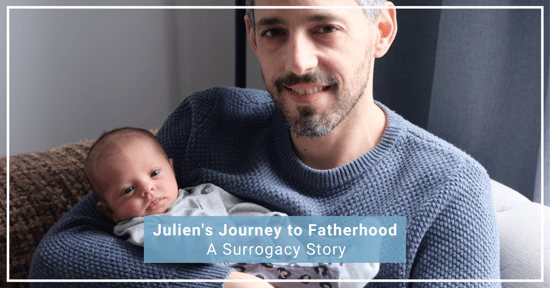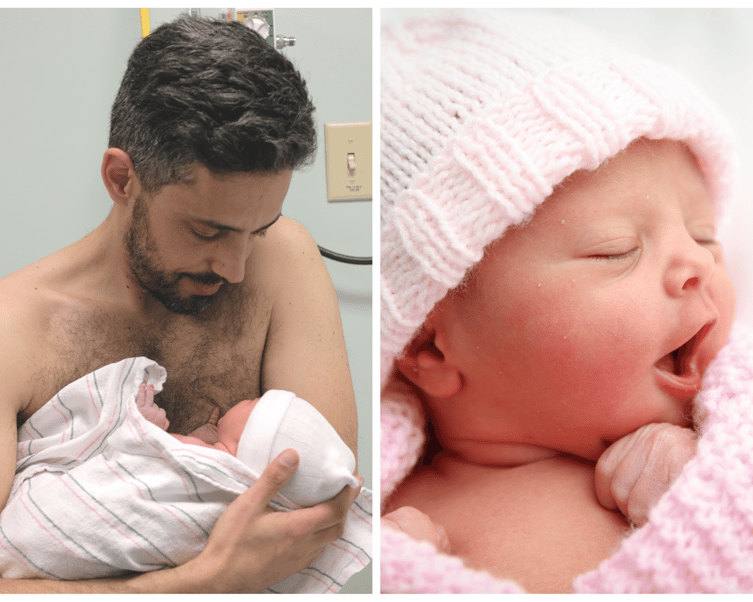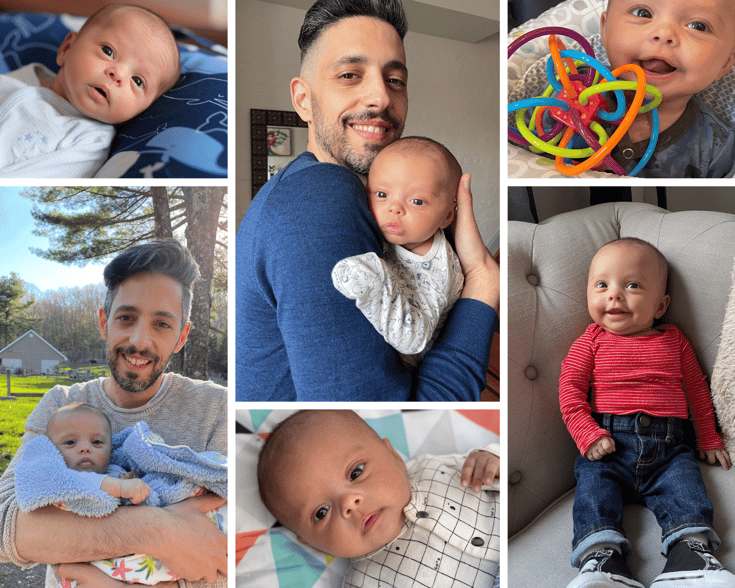A Single Dad's Long Journey to Fatherhood | Julien's Story
June 25th, 2021 | 11 min. read

While each person's path to parenthood may look a little different, there are many common threads - especially for those who go through fertility treatment to bring their babies into the world. Whether you're a member of the LGBTQ+ community or not, choosing to pursue IVF, egg donors, and surrogacy all look very similar. In this blog, we share Julien's story, a surrogacy journey with some surprises (and obstacles) along the way.
Meet Julien
“I always wanted kids," says Julien. "I always thought I would have a child, and it was never a question - since the time I was young - that I wanted to be a father.” Family was always important to him, and as the oldest child, he started feeling the pressure to bring grandkids into the world. But after he came to the realization that he was gay in his mid-20s, he realized he would have to find a different way of becoming a parent.
As he grew older, Julien started looking for information on what his possible options might be, exploring adoption and surrogacy as his two main avenues to parenthood. However, after becoming overwhelmed by how complicated and difficult adoption can be, he decided to pursue surrogacy. As he'd soon find out, surrogacy had its fair share of challenges too!
At first, he says, his view of the surrogacy process was a bit naive and oversimplified. He made a pact with another single female friend who was willing to be his gestational carrier: “Okay, by 35, if you’re still single without a kid, we’ll do it together.” At 34, she met someone and got pregnant, and his backup plan disappeared. That's when Julien decided to get serious about looking into surrogacy.
Choosing the Best Fertility Clinic
For Julien, research was key from the very beginning. He spent hours upon hours searching for fertility clinics, surrogacy agencies, and resources that would help him in his quest to become a father. He knew just how important it would be to have a reputable, inclusive fertility clinic with proven success rates, so he spent a lot of time comparing different options before making his final decision.
In 2018, when Julien first started looking at fertility clinic options, he kept coming across RMA of Connecticut and Gay Parents To Be on social media. After looking at our websites and resources, he reached out to book a consultation. One of his first visits was with Jamie Speer, RMA of Connecticut's genetic counselor, who gave him a preview of what the process might look like.
Still, Julien wanted to explore all of his options, so he went to a Men Having Babies conference in New York City, where he met Gay Parents To Be founder Dr. Mark Leondires (and Jamie Speer, this time in person). After narrowing it down to just two clinics, Julien now says "I don't know why I hesitated!" since there were so many things he liked about RMA of Connecticut. He connected with Dr. Leondires' personal family-building story, as a gay man and father through surrogacy himself, and felt like Dr. Leondires could truly relate to what he was going through.
Besides the personal connection, Julien also felt confident about RMA of Connecticut's success rates and laboratory setup and protocols, after having gone on a tour of the facility. He knew what a big decision it was to choose a clinic, and understandably wanted to pick the very best option for him and his future family!
Julien also appreciated that Dr. Leondires' approach to surrogacy was more conservative than many other fertility specialists he'd come across. He knew that Dr. L strongly advocates for single embryo transfers, with the goal being one healthy baby at a time - and loved the idea of working with a doctor who was conscious about achieving the best possible outcome.
Ready to take the first step?
The Start of the Surrogacy Process
Julien's father was very supportive of him pursuing surrogacy from the beginning, saying “It’s very normal to want a family, to want to have a kid,” and was very excited about the process. He admits his mother needed a little more time to adjust to the idea that her grandchild would be raised without a "mother figure," which she felt was important. Thankfully, as time went on, she came to accept that children are able to thrive in all different types of families and is now very supportive.
The surrogacy process almost didn’t feel very “real” to his family, Julien says, mostly because they live far away. But for Julien, surrogacy was constantly on his mind. “For a few years of my life, I was thinking about it every single day. I was waking up thinking about surrogacy and going to bed thinking about surrogacy.” It's such a complex journey - no wonder it took up so much of his brain!
Picking an Egg Donor Wasn't Easy
“A friend volunteered to give me her eggs," says Julien, so they went through the initial screening process to see if she'd be a good match. Unfortunately, they found out her ovarian reserve was low, which threw a wrench in their plans. Dr. Leondires was open and honest about the fact that while they could proceed and try to work with his friend and her eggs, the odds of success were a lot lower. With that in mind, Julien decided to pursue a donor from RMA of Connecticut's internal egg donor pool. It wasn't easy telling his friend about his choice, he says. His friend was so generous, so telling her the bad news was very hard, even though she understood. "It was the right decision," Julien says. “Everything happens for a reason.”
Choosing an egg donor was a very challenging process, as Julien knew he wanted a known donor, so his child could learn more about her later on. Looking for a known donor meant he had fewer choices. When he finally decided on a donor, he knew he'd found a great match when he went to RMA of Connecticut to meet her in person. “It really comforted me and made me believe I made the right choice," he says. While his donor was initially hesitant about having a more open relationship with Julien and his family, she has now fully embraced their connection, and Julien regularly sends her photos to share how they're doing.
It was important to him to make sure his children could know where they came from. At the suggestion of social worker Lisa Schuman, Julien even made a little book for his daughter Adele that explains her story and all the wonderful people who have played a major role in her life.
Learn how to share your child's creation story:
How long does the surrogacy process take?
While every journey is different, and the timeline fluctuates based on a variety of factors, the full surrogacy process from start to finish can take anywhere from one year to three years or more. Let's break down Julien's personal timeline:
- Fall 2018 - He chose RMA of Connecticut as his fertility clinic, chose his surrogacy agency, and signed agreements to work with them both
- November 2018 - He picked an egg donor and they did their egg retrieval
- February 2019 - Embryos created and safely stored at RMA of Connecticut
- February-August 2019 - Waited for his agency to find him a good gestational carrier match
- August 2019 - Matched with his gestational carrier, she went through the required health screenings at RMA of Connecticut and was cleared by their Third Party Team to begin the surrogacy process
- January 2020 - First embryo transfer, which was sadly unsuccessful
- March 2020 - COVID-19 pandemic put their plans for a second embryo transfer on hold
- May 2020 - Second embryo transfer was successful, began the pregnancy journey
- February 2021 - Julien's daughter Adele was born

The Highs & Lows of Surrogacy
After matching with a gestational carrier in August 2019, she went through a comprehensive screening process at RMA of Connecticut and was cleared to start trying to get pregnant. January 2020 was an exciting milestone: Julien's first embryo transfer - finally! Sadly, the embryo transfer was unsuccessful, which was a hard experience for both Julien and his gestational carrier.
“It’s like a mourning for your child, even if they’re not there...it really felt like a loss," Julien says of their first unsuccessful transfer. He didn’t expect the transfer to fail because he felt they had the best of everything: a perfect embryo transfer, a healthy gestational carrier, and great doctors. He realized he needed a break from the surrogacy process to regroup, so he took some time off, went on vacation and saw his family.
They geared back up for a second embryo transfer in March 2020, and then...the COVID-19 pandemic hit, putting their plans on hold. Julien kept in close contact with his assigned nurse, Rachel Leto, who he says patiently "put up with all his questions" and helped him feel more confident throughout the entire surrogacy process. Staying positive after his first transfer failed and COVID-19 hit was hard, leaving him to question if he was even meant to be a father - or if he should just stop trying.
When the fertility clinic reopened and resumed scheduling embryo transfers, Julien and his gestational carrier were first in line! Thankfully, his second embryo transfer was successful, and he was finally able to celebrate some good news.
Seeing that first positive pregnancy test after their second transfer with strong HCG numbers was a high point for him. “I was on clouds...I popped champagne!" he says. “You have to celebrate every little victory, otherwise you won’t be able to last - the process is so long!” Julien's gestational carrier had a pretty uneventful, textbook pregnancy and Adele arrived, perfect and healthy, in February 2021.
Check out Julien & Adele's story on The Today Show!
Advice to LGBTQ+ Parents-To-Be
Even though he thought of himself as a prepared, educated parent-to-be, Julien admits that he was overwhelmed by the sheer volume of information, financial burden, and emotional ups and downs of the surrogacy process. Now on the other side, he feels much more confident and knows he'll be prepared if he decides to have another child via surrogacy.
He loves sharing his story publicly and helping those who reach out to him for advice, as he knows just how valuable that visibility and support can be to others going through similar experiences. He regularly chats with intended fathers about surrogacy and tries to help educate and guide them so they can have the smoothest journey possible.
When asked what his advice to fellow LGBTQ+ parents-to-be was, Julien shared the following:
- Everything moves slower than you'd expect. Try to stay flexible and patient throughout the process!
- Pay attention to your gestational carrier's insurance plan, and budget for potential surprise costs.
- Take things step by step - just one thing at a time.
- Find someone to talk to who understands. Surrogacy is complex, and those who've been through it can be a great source of wisdom and guidance.
- Be sure you fully understand the contracts and agreements before you sign them.
- Reach out for support! Ask for help, talk to friends, join support groups, reach out to your care team.
- Ask all the questions. Don't hesitate because you feel like a bother - ask lots of questions and don't stop until you get answers.
- Do your research. There are a lot of players in the surrogacy game, so take time to fully vet your options.
Despite the challenges of the surrogacy process, Julien says:
"Everything vanished right away as soon as she was born. All the heartache, all the anxieties I had to endure, the sacrifices I had to make, were worth it."

Recommended Resources for LGBTQ+ Intended Parents
Two things Julien emphasizes are the importance of doing your research and reaching out for support. Having worked hard for ten years to save up for fertility treatment, he still found himself coming up short - easy to do when the process often costs upwards of $100,000. Throughout his surrogacy journey, he continued to apply for fertility treatment grants to help lessen the financial burden. While there is progress being made to get LGBTQ+ people more access to fertility benefits, many insurance providers still have frustrating policies in place that exclude them.
Some fertility treatment grants don't explicitly state whether they accept LGBTQ+ applicants, so it's always worth it to reach out and ask. For example, Julien was unsure if he'd qualify for a BabyQuest grant, since their website focused heavily on families dealing with infertility, but was happily surprised to find out he could apply (and he did end up receiving a grant from them, as well as from Men Having Babies).
Check out Julien's recommended resources below:
- Men Having Babies - an organization for gay men looking to pursue surrogacy. They offer financial grants, resources and support, seminars, conferences, online support groups, and even discounts on fertility treatment at participating clinics.
- BabyQuest - a foundation offering financial grants that help those in need of fertility treatment.
- RMA of Connecticut & Gay Parents To Be's virtual support groups offered Julien a safe space to connect with others who understood how difficult the fertility treatment roller coaster can be, which he says was incredibly helpful.
- RESOLVE - a non-profit dedicated to advancing fertility care access for all, including LGBTQ+ families! They offer support groups, community events, and other resources.
- Gays With Kids - robust online resources and more dedicated to helping gay, bi and trans dads and dads-to-be.
- Fertility Within Reach - another non-profit offering helpful resources and tools to advocate for yourself with insurance companies and much more.
What's next for Julien and his family?
After his daughter Adele was born, Julien says it was a big adjustment settling into new parenthood. "The first few months were chaotic and exhausting," and you have to throw all expectations out the window for a while. And then, "slowly but surely, your world reorganizes and everything falls into place,” Julien says. He took two months off from work to bond with Adele and take care of her full-time. These days, he's back to work and has help from a part-time nanny and daycare.
At five months old, Adele is a joy. "Every single day, she’s changing and learning new things," he says. And after everything he went through to bring Adele into the world, he's grateful to be her dad. He has three embryos safely stored at RMA of Connecticut and knows firsthand that the surrogacy process can be lengthy, so he's already thinking about Baby #2. But for now, he's simply enjoying life with his baby girl.
His parting advice for those going through surrogacy? “Even when it feels like it’s going to be forever, everything is temporary. Keep taking things one day at a time, and it will all fall into place."
Join our vibrant community of LGBTQ+ families!
Sierra Dehmler is the Content Marketing Manager for Gay Parents To Be and its partner clinic, Illume Fertility. She is also a fertility patient herself. Combining empathy gained on her personal journey with her professional experience in marketing and content creation, she aims to empower and support other hopeful parents by providing family-building resources that educate, inspire and encourage.



